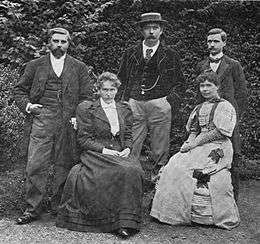Robert Barr (writer)
| Robert Barr (writer) | |
|---|---|
 | |
| Born |
16 September 1849 Glasgow, Scotland, UK |
| Died |
21 October 1912 Woldingham, Surrey, England, UK |
| Pen name | Luke Sharp |
| Occupation | Educator, Journalist, Editor, Publisher and Novelist |
| Nationality | Scottish |
Robert Barr (16 September 1849 – 21 October 1912[1]) was a Scottish-Canadian short story writer and novelist, born in Glasgow, Scotland.
Early Years in Canada
Barr emigrated with his parents to Upper Canada at age four and was educated in Toronto at Toronto Normal School. Barr became a teacher and eventual headmaster of the Central School of Windsor, Ontario. While he had that job he began to contribute short stories—often based on personal experiences—to the Detroit Free Press. In 1876 Barr quit his teaching position to become a staff member of that publication, in which his contributions were published with the pseudonym "Luke Sharp." This nom de plume was derived from the time he attended school in Toronto. At that time he would pass on his daily commute a shop sign marked, "Luke Sharpe, Undertaker", a combination of words Barr considered amusing in their incongruity.[2] Barr was promoted by the Detroit Free Press, eventually becoming its news editor.[3]
London years

In 1881 Barr decided to "vamoose the ranch", as he stated, and relocated to London, to establish there the weekly English edition of the Detroit Free Press.[4] In 1892 he founded the magazine The Idler, choosing Jerome K. Jerome as his collaborator (wanting, as Jerome said, "a popular name"). He retired from its co-editorship in 1895. In London of the 1890s Barr became a more prolific author—publishing a book a year—and was familiar with many of the best-selling authors of his day, including Bret Harte and Stephen Crane. Most of his literary output was of the crime genre, then quite in vogue. When Arthur Conan Doyle's Sherlock Holmes stories were becoming well-known Barr published in the Idler the first Holmes parody, "The Adventures of Sherlaw Kombs" (1892), a spoof that was continued a decade later in another Barr story, "The Adventure of the Second Swag" (1904). Despite the jibe at the growing Holmes phenomenon Barr and Doyle remained on very good terms. Doyle describes him in his memoirs Memories and Adventures as, "a volcanic Anglo—or rather Scot-American, with a violent manner, a wealth of strong adjectives, and one of the kindest natures underneath it all."[5]
Death
Robert Barr died from heart disease on 21 October 1912, at his home in Woldingham, a small village to the southeast of London.[6]
Works
- In a Steamer Chair and Other Stories (1892)
- The Face and the Mask (1894)
- In the Midst of Alarms (1894, 1900, 1912)
- From Whose Bourne (1896)
- One Day's Courtship (1896)
- Revenge!
- The Strong Arm
- A Woman Intervenes (1896)
- Tekla: A Romance of Love and War (1898)
- Jennie Baxter, Journalist (1899)
- The Unchanging East (1900)
- The Victors (1901)
- A Prince of Good Fellows (1902)
- The O'Ruddy, A Romance, with Stephen Crane (1903)
- The Speculations of John Steele (1905)
- The Tempestuous Petticoat (1905–12)
- A Rock in the Baltic (1906)
- The Triumphs of Eugène Valmont (1906)
- The Measure of the Rule (1907)
- Stranleigh's Millions (1909)
- The Sword Maker (1910)
- The Palace of Logs (1912)
In the Midst of Alarms is a story of the attempted Fenian invasion of Canada in 1866. A Woman Intervenes is a story of love, finance, and American journalism.
Notes
References
- Biography at the Dictionary of Canadian Biography Online
- Bleiler, Everett (1948). The Checklist of Fantastic Literature. Chicago: Shasta Publishers. p. 41.
- Jerome K. Jerome, My Life and Times (1926)
External links
| Wikisource has original text related to this article: |
| Wikiquote has quotations related to: Robert Barr (writer) |
| Wikimedia Commons has media related to Robert Barr. |
- Robert Barr at the Internet Speculative Fiction Database
- Works by Robert Barr at Project Gutenberg
- Works by or about Robert Barr at Internet Archive
- Works by Robert Barr at LibriVox (public domain audiobooks)

- FREE Sony Reader e-book version of The Triumph of Eugene Valmon by Robert Barr
- Within an Ace of The End of the World by Robert Barr (short story)